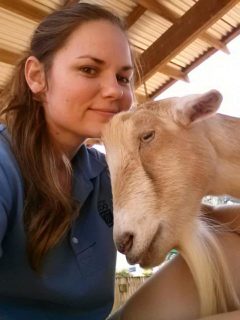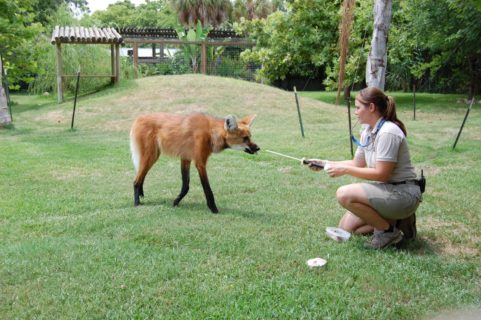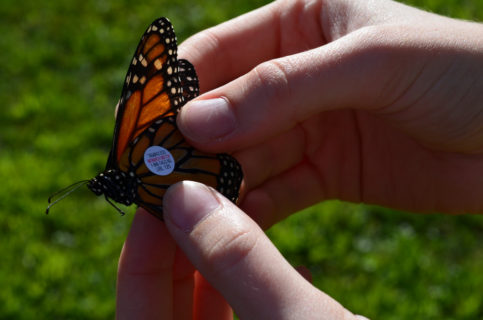I’m a Pollinator Pal
The Houston Zoo is well known for its efforts in saving wildlife. Sea turtles, Houston Toads, Attwater’s Prairie Chickens and even butterflies! Yearly, staff and volunteers participate in Monarch tagging. The butterflies are then reported to Monarch Watch when found so their migration can be tracked.
Some of our staff have a special interest in pollinators and are Staff Pollinator Pals. Throughout 2019, we will be spotlighting some of these elite staff so you can get to know them and learn about how they are helping pollinators.

Today we have put the spotlight on a very special staff pollinator pal! Michelle Castle is a Supervisor in the Children’s Zoo. She is also a Conservation Action Specialist for Pollinator Awareness and is one of the coordinators for the zoo’s annual Monarch Tagging. She is a native Texan and grew up in a little town just southwest of Houston. She has been with the Houston Zoo for 12 years. She started her career here as a temporary part-time keeper in the carnivore department which quickly turned into a full-time job. She was in the carnivore department for 6.5 years before she came to the Children’s Zoo.
When Michelle started helping coordinate the zoo’s Monarch Tagging saving wildlife opportunity, her love of pollinators really began to grow. She says “I learned so much about Monarchs and how important they are as pollinators. I was then asked to be a part of the Zoo’s Pollinator Take Action Initiative as co-lead, and since then my interest and knowledge of pollinators has soared.”

Her favorite pollinator is not a traditional one but an amazing one. It is the Maned Wolf! They are considered seed dispersing pollinators. They are solitary omnivorous wolves from South America that eat different fruits, mainly the lobeira fruit and helps to disperse the seeds. Michelle also loves bees!
At home, Michelle and her husband have planted many native pollinator host and nectar plants to attract and support local pollinators. At the Zoo she helps pollinators by coordinating the monarch tagging each year for staff. Tagging monarchs through an organization called Monarch Watch helps to determine their migration pathways so we can help protect them. Monarch tagging is something anyone can do at home. For more information, follow this link to see Monarch Watch’s web page. https://monarchwatch.org/

When asked what she would like people to know the most about pollinators, this is what she had to say: “There are a lot of different types of pollinators, from beautiful butterflies, to social bees, to unfamiliar ones like wasps and flies as well as seed dispersers, such as bears and maned wolves. They all play such an important part in providing a service that enables us to enjoy an amazing portion of our favorite foods! It is necessary to appreciate and respect them and the part they play in our natural world!”
If you would like to plant a pollinator friendly garden at your own home, here are some awesome resources for plant selection and purchase:
Houston Audubon: http://www.birdfriendlyhouston.org/get-started/the-basics/native-plants/natives-nursery/
Native American Seed: http://www.seedsource.com/Default.asp
Native Plant Society of Texas, Houston Chapter https://npsot.org/wp/houston/
Another benefit to planting your own pollinator garden. Bring photos, reports or journals about your garden to the Swap Shop at the Houston Zoo. You will be registered as a Houston Zoo Pollinator Pal along with earning points to spend in the shop! Don’t know about the shop? Click here to learn more.
